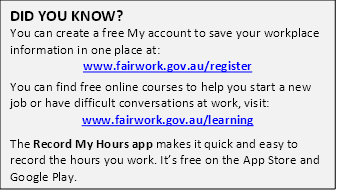![]()
![]() Employees in Australia have entitlements and protections at work, under:
Employees in Australia have entitlements and protections at work, under:
COMMONWEALTH OF AUSTRALIA
Fair Work Act 2009
Notice under section 124(1) of the publication of the Fair Work Information Statement
I, SANDRA PARKER, Fair Work Ombudsman, acting in accordance with section 124(1) of the Fair Work Act 2009, hereby GIVE NOTICE, of the publication of the Fair Work Information Statement as set out herein:
Sandra Parker
Fair Work Ombudsman
29/06/2020
![]()
![]() Employees in Australia have entitlements and protections at work, under:
Employees in Australia have entitlements and protections at work, under:
Find your award at www.fairwork.gov.au. Check if your workplace has an enterprise agreement at www.fwc.gov.au/agreements
Your minimum pay rates are in your award or enterprise agreement. If there is no award or agreement for your job, you must get at least the National Minimum Wage. You can’t agree to be paid less. Minimum pay rates are usually updated yearly.
Find out what you should get at www.fairwork.gov.au/minimum-wages
This is the adult minimum rate for employees with no award or enterprise agreement. Lower rates may apply to juniors, apprentices and employees with disability.
Use our free calculators to check your pay, leave, and termination entitlements at: www.fairwork.gov.au/pact
![]() These are minimum standards for all employees. Rules and exclusions may apply. Your award or agreement may provide more. Find more information on the National Employment Standards at www.fairwork.gov.au/NES
These are minimum standards for all employees. Rules and exclusions may apply. Your award or agreement may provide more. Find more information on the National Employment Standards at www.fairwork.gov.au/NES
| Full-time and part-time employees | Casual employees |
Annual leave |
(pro rata for part-time employees) + 1 week for eligible shift workers |
|
Personal leave* (sick or carer’s leave) |
|
|
Carer’s leave |
|
|
Compassionate leave |
|
|
Family & domestic violence leave |
|
|
Community service leave
|
+ unpaid leave as required |
|
|
|
|
Long service leave |
|
|
Parental leave eligible after 12 months employment |
|
|
Maximum hours of work |
Part-time and casual employees - 38 hours or employee’s ordinary weekly hours (whichever is less) + reasonable additional hours | |
Public holidays |
|
|
Notice of termination |
|
|
Redundancy pay eligible after 12 months employment |
|
|
After 12 months employment, you can make a written request for flexible working arrangements if you’re 55 or over, a carer, have a disability, are experiencing violence from a family member (or are supporting a family or household member who is), or are the parent of, or have caring responsibilities for, a child of school age or younger. This includes employees returning from parental or adoption leave asking to work part-time to care for the child. Your employer must respond in writing within 21 days. They can only say no on reasonable business grounds.
You and your employer can also negotiate an individual flexibility arrangement. This would change how certain terms in your award or enterprise agreement apply to you. An individual flexibility arrangement must be a genuine choice – it can’t be a condition of employment – and it must leave you better off overall. Find out more at:
 www.fairwork.gov.au/flexibility
www.fairwork.gov.au/flexibility
When your employment ends, your final pay should include all outstanding entitlements, such as wages and unused annual leave and long service leave.
You may be entitled to notice of termination, or pay instead of notice. If you’re dismissed for serious misconduct, you’re not entitled to notice. If you resign you may have to give your employer notice. To check if notice is required and what should be in your final pay visit:
www.fairwork.gov.au/ending-employment
If you think your dismissal was unfair or unlawful, you have 21 calendar days to lodge a claim with the Fair Work Commission. Rules and exceptions apply. Find out more at:
Who can help? | |
FAIR WORK OMBUDSMAN
www.fairwork.gov.au – 13 13 94 | FAIR WORK COMMISSION
www.fwc.gov.au – 1300 799 675 |
www.fairwork.gov.au/termination
All employees have protections at work. You can’t be treated differently or worse because you have or exercise a workplace right, for example, the right to request flexible working arrangements, take leave or make a complaint or enquiry about your employment.
You have the right to join a union or choose not to, and to take part in lawful industrial activity or choose not to.
You also have protections when temporarily absent from work due to illness or injury, from discrimination, bullying and harassment, coercion, misrepresentation, sham contracting, and undue influence or pressure. Find out more at:
www.fairwork.gov.au/protections
Enterprise agreements are negotiated between an employer, their employees, and any employee representatives (e.g. a union). This process is called ‘bargaining’ and has to follow set rules. The Fair Work Commission checks and approves agreements. For information about making, varying, or terminating an enterprise agreement visit:
If a transfer of business occurs, your employment with your old employer ends. If you’re employed by the new employer within three months to do the same (or similar) job, some of your entitlements might carry over to the new employer. This may happen if, for example, the business is sold or work is outsourced. Find out more at:
www.fairwork.gov.au/transfer-of-business
Union officials with an entry permit can enter the workplace to talk to workers that they’re entitled to represent, or to investigate suspected safety issues or breaches of workplace laws.
They must comply with certain requirements, such as notifying the employer, and can inspect or copy certain documents. Strict privacy rules apply to the permit holder, their organisation and your employer. Find out more at:
![]() If you work in the commercial building industry the Australian Building and Construction Commission can help. www.abcc.gov.au – 1800 003 338
If you work in the commercial building industry the Australian Building and Construction Commission can help. www.abcc.gov.au – 1800 003 338